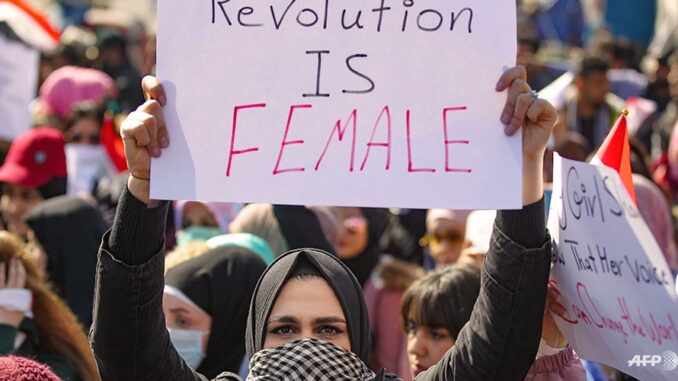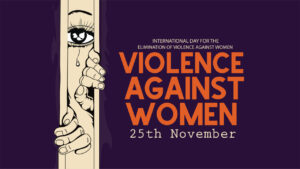
Kailee Tones, Toronto

The Government of Iraq and local actors have teamed up with the United Nations to start a gender-based violence movement, and together they are already making waves.
Today is the International Elimination of Violence against Women Day which starts a sixteen day period of acting against gender-based violence (GBV).
According to United Nations Iraq, one in three women 15 years and older around the world experience at least one encounter with sexual gender-based violence. Which is the same percentage it was ten years ago. It is said that the Covid-19 pandemic only made the risks for women and girls higher.
Iraq actors, the government and the UN are joining forces to enhance services for gender-based violence survivors. Which will include healthcare services, legal aid and case management. This plan is a great beginning for survivors in Iraq. However they are still working on building a stronger foundation to help these women and future victims.
The UN stated that in Iraq, women are a big target for gender-based violence due to the lower socio-ecnomic power within politics. Iraq is not the only country experiencing this violence though. Many vulnerable groups such as displaced people, returnees, as well as refugees from places like Syria are also facing heightened risks of exploitation and sexual violence.
If women and girls are given the freedom of safety in their communities, the UN states that they will have a more successful future. They will feel safe going to school and getting their education in order to achieve their goals professionally. Then beyond education, they will be able to work without fear of being objectified by men. This freedom will build communities, and give women a better life.
For these reasons, the Iraq government is demanding action. The government as well as stars and activists are dedicated to making the changes necessary to make more women’s lives safer. They are urging the Iraq Parliament to endorse the Anti-Domestic Violence law which targets the judicial retort for prosecuting gender-based violence cases. They want to make sure that all perpetrators are amendable for the acts they have committed.
The plan for reaching women as individuals is to empower them by helping them get new job opportunities, as well as promote approaches to a new social change. This will target men and boys and the conversation of creating a healthy environment for women. So that they are able to participate in education and employment opportunities equally without the fear of violence and harassment.
The UN is calling for everyone around the world to use their voice and stand up for women’s rights, and safety against gender-based violence. Take this sixteen day gender-based violence recognition period to spread awareness and do what you can to help women around the world.
Derived from the United Nations Iraq
24 November 2021; Baghdad, Iraq – As we mark the International Day for the Elimination of Violence against Women, and the launch of 16 Days of Activism Against Gender-Based Violence (GBV), we are reminded that GBV harms women and girls’ health and well-being. According to the latest estimates, nearly 1 in 3 women aged 15 years and older around the globe, at least once in their lifetime have experienced a form of sexual and gender-based violence indicating that levels of violence against women and girls have remained largely unchanged over the last decade. Furthermore, the COVID-19 pandemic increased the risks for women and girls to undergo violence and abuse during the lockdown. In Iraq, the Government and local actors, with support from the United Nations, are working to improve services for survivors, including access to healthcare, survivor-centred case management and legal assistance. Yet, more needs to be done. GBV disproportionately harms women and girls because of their lesser socio-economic political power in relation to men and the discrimination they suffer to enter the labour market. Vulnerable groups like internally displaced persons, returnees, as well as Syrian and other refugees also face increased risks of sexual violence and exploitation. We urge the Parliament to endorse the Anti-Domestic Violence law aimed at improving the judicial response to prosecuting GBV cases and ensuring that perpetrators are held accountable for their actions. Survivors of violence need protective spaces and environments to feel safe and empowered to thrive. Countering impunity for perpetrators; providing survivor-centred care; improving services for survivors, economically empowering women through providing decent job opportunities and promoting culturally sensitive approaches to social change and positive behaviours of men and boys can help create conditions for women and girls to participate in societies free from violence and harassment, including in the workplace. The engagement of boys and men as allies to end gender-based violence is equally needed to create a safer society for women and girls. We must stand together, speak up and take action against all forms of violence against women and girls in Iraq. We will continue our joint efforts to support the implementation of UNSCR 1325 advocating for women’s political participation and protecting women and girls from GBV. Freedom from violence will help women and girls reach their educational and professional goals; achieve economic independence; build careers and contribute to the development of their communities and society at large. Together, let’s End Violence Against Women Now!

Be the first to comment